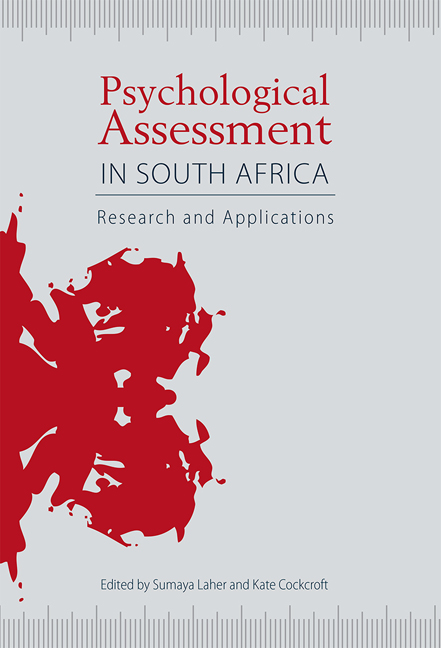Book contents
- Frontmatter
- Contents
- Tables and figures
- Acknowledgements
- Acronyms and abbreviations
- 1 Contextualising psychological assessment in South Africa
- Section One Cognitive tests: conceptual and practical applications
- 2 WAIS-III test performance in the South African context: extension of a prior cross-cultural normative database
- 3 WISC-IV test performance in the South African context: a collation of cross-cultural norms
- 4 The Senior South African Individual Scales – Revised: a review
- 5 Assessing school readiness using the Junior South African Individual Scales: a pathway to resilience
- 6 School readiness assessment in South Africa
- 7 The Kaufman Assessment Battery in South Africa
- 8 The Das-Naglieri Cognitive Assessment System
- 9 Dynamic assessment in South Africa
- 10 The Learning Potential Computerised Adaptive Test in South Africa
- 11 APIL and TRAM learning potential assessment instruments
- 12 The Griffiths Mental Development Scales: an overview and a consideration of their relevance for South Africa
- 13 Neuropsychological assessment in South Africa
- Section Two Personality and projective tests: conceptual and practical applications
- Section Three Assessment approaches and methodologies
- Contributors
- Index
10 - The Learning Potential Computerised Adaptive Test in South Africa
from Section One - Cognitive tests: conceptual and practical applications
Published online by Cambridge University Press: 21 April 2018
- Frontmatter
- Contents
- Tables and figures
- Acknowledgements
- Acronyms and abbreviations
- 1 Contextualising psychological assessment in South Africa
- Section One Cognitive tests: conceptual and practical applications
- 2 WAIS-III test performance in the South African context: extension of a prior cross-cultural normative database
- 3 WISC-IV test performance in the South African context: a collation of cross-cultural norms
- 4 The Senior South African Individual Scales – Revised: a review
- 5 Assessing school readiness using the Junior South African Individual Scales: a pathway to resilience
- 6 School readiness assessment in South Africa
- 7 The Kaufman Assessment Battery in South Africa
- 8 The Das-Naglieri Cognitive Assessment System
- 9 Dynamic assessment in South Africa
- 10 The Learning Potential Computerised Adaptive Test in South Africa
- 11 APIL and TRAM learning potential assessment instruments
- 12 The Griffiths Mental Development Scales: an overview and a consideration of their relevance for South Africa
- 13 Neuropsychological assessment in South Africa
- Section Two Personality and projective tests: conceptual and practical applications
- Section Three Assessment approaches and methodologies
- Contributors
- Index
Summary
In the multicultural and multilingual South African context, differences in socio-economic and educational background and development opportunities complicate psychological assessment (Claassen, 1997; Foxcroft, 1997; 2004). In this complex context, the measurement of learning potential provides additional information in the cognitive domain and has shown positive results in terms of psychometric properties and practical utility (De Beer, 2006; 2010b; Lidz, 1987; Murphy & Maree, 2006). Measurement of learning potential implies that assessment includes a learning experience or assistance, and typically adopts a test-train-retest approach. Measurement is therefore expanded to include two sets of measures, as well as a learning opportunity relating to the test task. Such assessments are also referred to as dynamic assessment (DA). DA allows for learning experiences to take place during assessment with a view to measuring learning potential, thus measuring not only the present level of performance of individuals but also the projected or potential future levels of performance these individuals may be able to attain if relevant learning opportunities can be provided.
This approach to assessment is generally associated with Vygotsky's (1978) theory of the ‘zone of proximal development’ (ZPD). This theory distinguishes between current performance (without help) – also referred to as the ‘zone of actual development’ (ZAD) – and performance that can be attained when relevant learning opportunities are provided, the ZPD. In DA, this same distinction is made in terms of a focus on measures obtained in a pre-test (unassisted performance) and a post-test (performance after learning or with assistance). Of importance is the fact that in interpreting the results of learning potential assessment of persons with varying educational qualifications, and across a wide range of ability/performance levels, learning potential is defined as the combination of current and projected future (potential) performance, and not only in terms of the improvement score (De Beer, 2000a; 2010a). The focus is not only on whether the individual will generally be able to profit from learning, but more specifically on what level of learning/training he or she will be able to cope with – or alternatively, to what degree he or she seems able to cope with a particular level of training offered.
- Type
- Chapter
- Information
- Psychological Assessment in South AfricaResearch and Applications, pp. 137 - 157Publisher: Wits University PressPrint publication year: 2013



